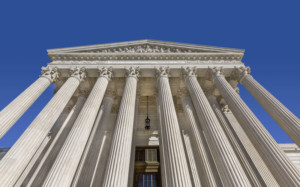 SCOTUS to decide the issue of “implied certification” in Universal Health Services v. United States ex rel. Escobar
SCOTUS to decide the issue of “implied certification” in Universal Health Services v. United States ex rel. Escobar
On December 4, 2015, the Supreme Court granted the defendant United Health Services’ Petition for a Writ of Certiorari to decide, among other things, the issue of whether the “implied certification” theory of legal falsity under the False Claims Act is viable.
Escobar involved a teenaged girl, a Medicaid beneficiary, who was treated by unlicensed workers who had held themselves out to be social workers, psychologists, and psychiatrists, when they were nothing of the sort. Treatment by these workers led to the girl’s death when she was prescribed a drug that caused her to have seizures, one of which was fatal.
The girl’s parents brought a False Claims Act suit, arguing that the clinic, in submitting bills to Medicaid for services rendered in connection with the treatment of the girl and other Medicaid recipients fraudulently misrepresented that those staff members were properly licensed and supervised. The trial court dismissed the suit, arguing that the rules regarding licensure and supervision were not “conditions of payment,” but, rather, “conditions of participation,” making the claims not legally false. The U.S. Court of Appeals for the First Circuit reversed the trial court’s decision, holding that the formalistic distinction between conditions of payment and conditions of participation was not relevant to the question of “whether the defendant, in submitting a claim for reimbursement, knowingly misrepresented compliance with a material precondition of payment.”
Some Courts, including the Seventh Circuit, have distinguished between claims that are factual falsities and legal falsities. For example, factual falsities are claims where a contractor overbills or fails to deliver goods or services. A legal falsity is a claim where a contractor, while providing goods and services, did not comply with a condition of payment imposed by statute, regulation, or contract. Regarding legal falsity, courts have further created a division between “express” and “implied” certifications for payment. An express certification is compliance with an explicit requirement for payment. An implied certification is the representation that a contractor has complied with a requirement that would be material to payment by the government. In other words, the theory of implied certification asks: Has the contractor broken a rule that would cause the government to deny the claim if it knew about the violation? The Seventh Circuit has rejected false claims premised on this theory.
Other courts have dismissed these distinctions, which are not found in the text of the False Claims Act. In Escobar, the First Circuit upheld the theory of implied certification. The First Circuit’s approach allows prosecutors of the False Claims Act to recover more fraudulently reimbursed funds from programs like Medicaid and Medicare. Instead, it focuses the court’s attention on simply whether the government would pay the claim if it knew the truth about the defendant’s conduct.
This disagreement between the Appeals Courts led the Supreme Court to take the case. A decision is likely some time before the Court’s term ends in late June.